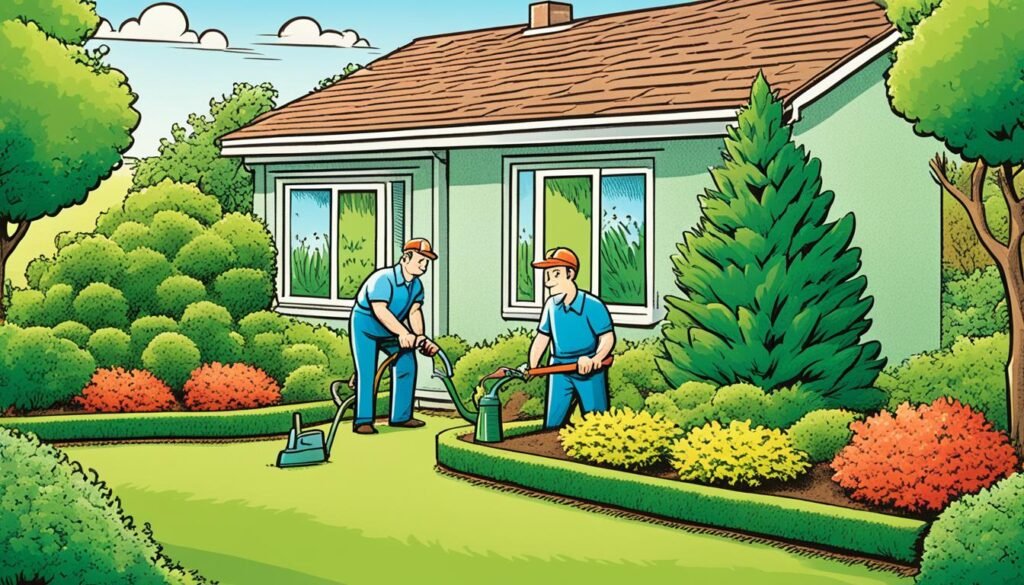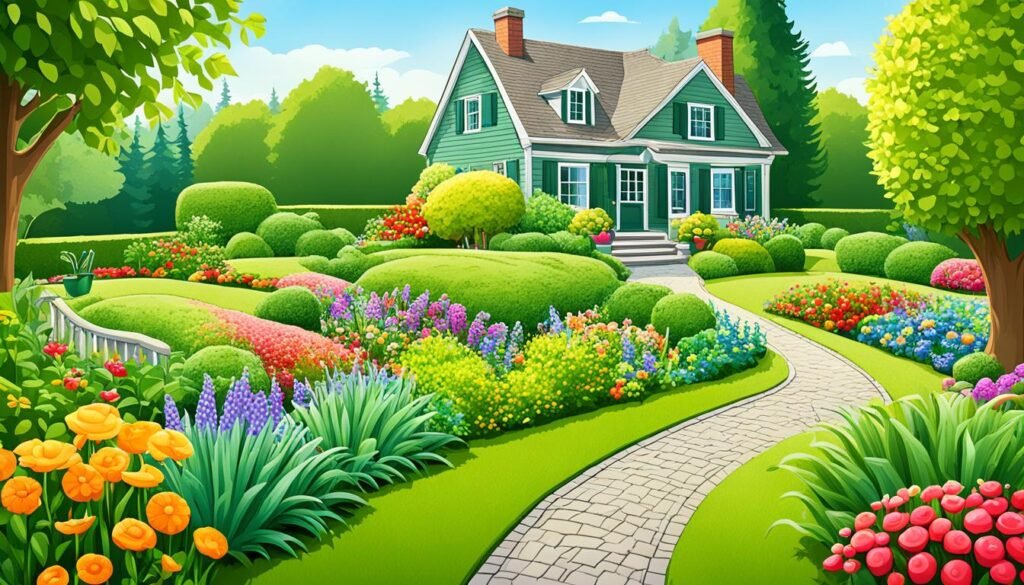As a landlord, you might come across a garden that’s not been looked after. Weeds have taken over, and it’s frustrating. But, the big question is this: should you have to keep the garden nice, or is it your tenant’s job? Let’s dive into this issue to shed some light on what’s what.
For tenants, having a nice garden is a plus. It means they have a place outdoors for fun and relaxation. The desire for properties with gardens has shot up by a huge 98% in recent years. But, figuring out who should maintain the garden can be unclear for both landlords and tenants.
Key Takeaways
- Landlords and tenants often have differing expectations when it comes to garden maintenance responsibilities.
- Tenants may assume the landlord is responsible for the garden, while landlords expect the tenant to take care of it.
- Tenancy agreements should clearly define the respective responsibilities of the landlord and tenant regarding the garden.
- Landlords are typically responsible for tasks that require specialist expertise or equipment, such as tree pruning and fence repairs.
- Tenants are generally expected to handle basic garden upkeep, like mowing the lawn and weeding.
Introduction: The Importance of Well-Maintained Gardens
Gardens are a big plus for many renters. They offer great outdoor spaces for fun, chilling out, and doing things. Even a small garden is a must-have now, after the COVID-19 outbreak. Having some green area is super important for people. Lots of people looking for a place to live won’t even consider those without a garden. This is especially true for families with kids and pets.
Outdoor Spaces as a Selling Point
A garden in good shape can raise a property’s worth. Places with bigger gardens often get snatched up fast. This makes them a plus for both people renting and letting houses.
Tenant Preferences and Demand for Gardens
Since the pandemic, having outdoor space has become a top need for renters. Landlords with beautiful, well-kept gardens might attract and keep better tenants.
The Impact of Garden Maintenance on Property Value
Keeping gardens nice can sometimes cause arguments between landlords and tenants. But, landlords who look after their gardens well might find renting or selling their property easier. They could also get more money for it.
Who is responsible for garden Maintenance, Landlord or tenant?
Who looks after the garden in a rented home can cause debate. Tenants sometimes think caring for the garden is the landlord’s job. On the other hand, landlords expect tenants to do it. Experts in renting properties find that often there’s a mix-up about who should maintain the garden. This misunderstanding can lead to disappointments or jobs not getting done.
For many renters, a nice garden is a big plus. Outdoor spaces affect the decision of whether to rent a place. They’re especially important for families with kids or pets, and for those who like to entertain outside. People who plan to stay in the same place for a long time often look after the garden themselves. They see it as part of their home and don’t mind putting in the effort to keep it nice.
In rental contracts, landlords write down what they expect tenants to do in the garden. This can range from cutting the grass to taking care of the flowers. The landlord’s duty is usually making sure the garden is safe. They handle jobs like cutting big tree branches, fixing fences, and keeping the extra land in good shape.
Sometimes, landlords hire gardeners for properties with big or tricky gardens. The expense of this might be added to the rent cost. It can also make the place more desirable to future tenants.1 Gardens that need less upkeep, like those with plastic grass or simple landscapes, are becoming more popular for rentals. They cut down on the work for both tenants and landlords.
Tenancy Agreements and Garden Maintenance Clauses
Who’s in charge of keeping the garden nice in a rented home? The tenancy agreement decides. It should clearly state what the landlord and tenant must do. This makes sure both sides know their part, keeping things peaceful.
Defining Tenant and Landlord Responsibilities
The agreement tells the tenant to look after the lawn, pull up weeds, and trim small bushes. On the other hand, the landlord is responsible for tasks like cutting big trees and mending fences. Separating who does what helps everyone know their role. It means the garden gets looked after well.
Specifying Maintenance Expectations
The agreement also sets out how often the garden should be taken care of. It says when to mow the lawn and cut the hedges. Having this in writing means both sides can agree easily. They know what needs to be done for the garden.
Restrictions on Garden Alterations
Tenants can’t change the garden without checking with the landlord first. This rule stops them from doing things that could lower the property’s value. It also keeps the landlord’s maintenance plan on track, making sure the garden stays nice.
Tenant Responsibilities for Garden Upkeep
As a tenant, you’re in charge of the basic garden care. This means mowing the lawn, pulling out weeds, and trimming small bushes. You should also clear any garden waste. But, landlords can’t ask you to do big jobs, like handling major tree work, on your own.
Mowing the Lawn
Keeping the grass cut is crucial for garden upkeep. It makes sure the outside area looks neat and tidy.
Weeding and Pruning
It’s up to you to weed the flower beds and prune the little bushes. This stops the garden from looking messy. Plus, it keeps the plants healthy and in good shape.
Disposal of Garden Waste
You’ll need to get rid of any garden waste properly. This could be things like cut grass, leaves, or branches. It’s your job to make sure the garden stays clean and clear.

Landlord Responsibilities for Garden Maintenance
Being a landlord means you must keep the property, including the outside space, well-maintained. You should handle tasks like cutting trees, making sure hedges are not too tall, fixing fences, and keeping decks in good shape. These jobs might need special tools or know-how that your tenant may not possess.
Tree Pruning and Maintenance
It’s the landlord’s job to look after the trees on the property, too. This includes cutting the trees and getting rid of the branches properly. It’s important to do this to stop the trees from getting too big and causing problems.
You should make sure the trees are not dangerous, too.
Hedge Trimming
Landlords should also make sure any hedges are cut and kept nice. This makes the garden look good and stops hedges from taking over or getting in the way.
Boundary Fences and Walls
It’s up to you to fix and keep watch over the boundary structures. This way, the property lines are clear. Making sure these things are in good shape is your responsibility as a landlord.
Decking and Patio Repairs
If there are decks, patios, or other paved areas, you need to maintain them. Fill in cracks, stop weed growth, and fix them up as necessary. Well-kept outdoor spaces make your rental property more attractive.
Inventory, Check-In, and Check-Out Reports
Landlords must make detailed reports for their garden’s condition at the start and end of tenancies. These reports should include both written and photo descriptions of the garden. It’s crucial that tenants check and sign these reports to confirm they agree with what’s written.
Documenting Garden Condition
Experts use these reports to solve any disagreements, so it’s vital they’re done well. These documents must show exactly how the garden looks with words and pictures.
Photographic Evidence
Taking clear photos of the garden at the before and after the tenancy is very important. This will help in case anyone argues about who should pay for particular maintenance.
Tenant Consent and Signatures
Tenants need the landlord’s ok before they change or upgrade anything in the garden. By making sure tenants look over and sign these reports, it’s clear who’s in charge of what.

Providing Gardening Equipment
Landlords aren’t legally required to give tenants gardening tools. However, it’s a great way to motivate them to care for the garden. Offering tools like a lawnmower, pruning shears, and a rake makes looking after the garden easier. This gesture helps ensure the garden stays in good shape.
It’s vital that the gardening equipment is kept in top-notch condition. They should also be safely stored, including any needed safety gear like RCDs. This measure protects your investment and the tenants using the tools.
| Gardening Equipment Provided | Benefits |
|---|---|
| Lawnmower | Encourages regular mowing to maintain a tidy lawn |
| Pruning Shears | Enables tenants to prune shrubs and small plants |
| Garden Rake | Helps with leaf clearing and general garden tidiness |
| Securely Stored Equipment | Prevents unauthorised use and ensures proper maintenance |
By offering and maintaining gardening tools, you’ll see your tenants take more pride in their garden. This helps them keep the outdoor area nice and tidy.
Outsourcing Garden Maintenance
Landlords with lots of properties or big gardens might find it cheaper to hire a professional gardener. This keeps the gardens looking great and takes the work off the tenants. This approach makes sure the gardens stay in top shape.
Hiring Professional Gardeners
Getting a specialist to look after the garden could save money for landlords with many properties. They should compare the costs of a gardener to the benefits. A well-kept outside area makes the property more attractive and valuable.
Cost-Benefit Analysis
Landlords often prefer long-term tenants who take better care of the garden. It might be a good idea for landlords with a lot of homes to let a gardener manage. They can add the gardening cost to the rent.
Following health and safety rules for garden tools, especially power ones, is crucial. Landlords must keep the tools in good shape and use safety items like RCDs.
Adding a garden maintenance rule in the rental agreement can stop arguments. It’s key for landlords and tenants to agree on who does what for the garden. Clear rules in the agreement help avoid problems by stating duties clearly.
It’s very important to check the garden carefully at the start and end of each rental. Keeping records like inventory reports can fix disagreements on garden care.
Landlords need to think about the garden all year round. They should make sure it’s looked after well before winter. This stops big problems later.
Knowing what’s normal and what’s not for garden wear is crucial. Tenants must keep the garden as it is but don’t need to improve it unless agreed. Landlords look after parts of the garden that are too hard for tenants to manage, like big trees.

Low-Maintenance Garden Design
If you’re a landlord, it’s smart to think about a low-maintenance garden design. It makes the garden easy for you and your tenants to look after. Features like weed control membranes and artificial turf help keep the garden neat with less work. They’re great for reducing effort on keeping your outdoor space attractive.
Weed Control Membranes
Weed control membranes are handy. They cut down the need for constant weeding in flower beds and borders. For landlords with tenants who don’t love gardening, these membranes are a win.
Artificial Turf
Choosing artificial turf over a natural lawn can save you a lot of time. There’s no need to mow it, water it, or put down fertilizer. This makes it ideal for landlords aiming to lower garden work.
Paving and Decking Considerations
Opting for paved or decked areas can be wise. They need much less care than traditional lawns and flower beds. This means more free time not spent on constant maintenance tasks. Plus, they can make your garden more appealing to future tenants.
A low-maintenance garden plan is a win-win for you and your renters. It reduces issues over who does the gardening. And it keeps your garden a positive part of your property.
Conclusion
Garden maintenance in rental homes can lead to confusion between landlords and tenants. By outlining responsibilities in the tenancy agreement and offering needed tools, many issues can be avoided. A low-maintenance garden is also a smart choice. It ensures the outdoor area remains attractive, benefitting both the landlord and the tenant.
Did you know, disputes over garden care make up 12-15% of all issues reported on mydeposits.co.uk? According to the Landlord and Tenant Act 1985, landlords must maintain the structure and exterior. This includes fencing, walls, and decks. Yet, tenants are usually in charge of regular tasks like cutting the grass and watering plants.
By making maintenance rules clear in the tenancy agreement, you can reduce disagreements. Including some gardening tools might also encourage tenants to keep up with the work, even though it’s not a rule for landlords to provide them. Or, going for a garden that’s easy to look after can be a great strategy. It makes the property’s outdoor area more appealing and less work for everyone.




